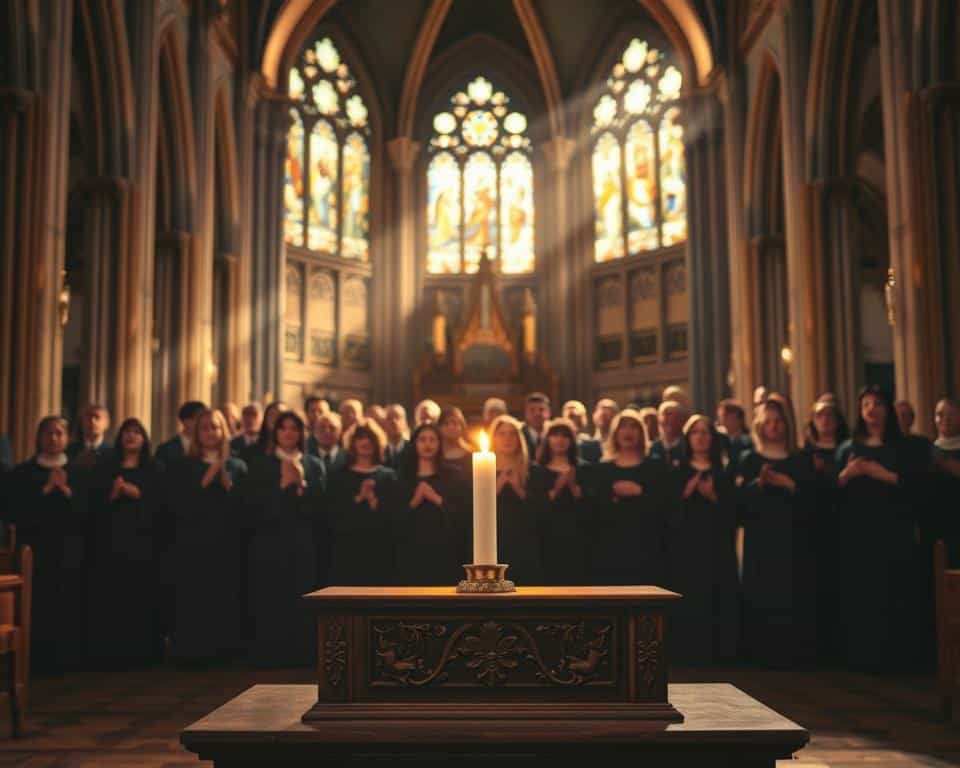“The Bible is the revelation of God’s truth to mankind. If we don’t have that, we have nothing.” —John MacArthur. These words remind us why God’s Word stands at the heart of true worship. Without it, our gatherings risk becoming hollow routines.
Today, many churches treat worship like a concert followed by a lecture. But biblical worship is far deeper. It’s a covenant-renewal drama, shaping believers through truth. 2 Timothy 3:16-17 tells us Scripture equips us for every good work—including worship. This understanding challenges us to see worship as an active engagement with God’s Word, rather than a passive experience. As we participate in this covenant-renewal, how service transforms into worship becomes evident; each act of service becomes a reflection of our devotion. Ultimately, true worship ignites a passion for living out the truths we encounter in Scripture, empowering us to reflect Christ in every aspect of our lives.
When we center our gatherings on God’s Word, lives change. Singing, prayer, and preaching become more than rituals. They form disciples. Neglecting this foundation leads to human-centered practices, missing the transformative power of truth.
Let’s explore how Scripture defines worship—not as an emotional experience, but as a life-shaping encounter with the living God.
The Role of Scripture in Worship
The early church built worship practices directly from biblical commands. Paul’s letters to Timothy outline this clearly: “Devote yourself to the public reading of Scripture” (1 Timothy 4:13). This wasn’t a suggestion—it was God’s design for His people.

Scripture as the Foundation of Worship
Every part of worship must align with God’s truth. Singing, prayer, and sacraments like baptism find their purpose in Scripture. For example, Paul ties singing to “the Word of Christ” (Colossians 3:16). Without it, melodies lack meaning. Similarly, prayer must be rooted in biblical principles to be effective and align with God’s intentions. This highlights the importance of hymns in worship, as they encapsulate theological truths and communal beliefs that inspire and uplift congregations. Ultimately, when all elements of worship are centered on Scripture, they collectively draw the community closer to God.
Even prayer follows biblical patterns. Jesus taught His disciples how to pray (Matthew 6:9–13). The early church echoed this, lifting “supplications, intercessions, and thanksgivings” (1 Timothy 2:1).
How God’s Word Guides Christian Practices
Spontaneous worship has its place, but Scripture sets the standard. The Reformers reclaimed this truth, insisting on preaching and singing in common languages. Why? So everyone could engage with God’s Word.
Baptism and communion aren’t traditions—they’re commands. Jesus Himself instituted them (Matthew 28:19; Luke 22:19–20). When we obey, we proclaim the gospel without words.
“All Scripture is breathed out by God and profitable for teaching, for reproof, for correction, and for training in righteousness.”
From Old Testament feasts to New Testament gatherings, God’s people have always worshipped through His Word. Today, that same truth anchors our faith.
Biblical Elements of Worship
True worship isn’t random—it’s rooted in divine patterns. God gave His people clear instructions, from Sinai’s commandments to the early church’s gatherings. These elements still shape faithful worship today.

Public Reading of Scripture
Moses commanded Israel to read God’s Word publicly every seven years (Deuteronomy 31:10–13). The early church continued this, dedicating time to hear the text aloud (Colossians 4:16). Why? Faith comes by hearing (Romans 10:17).
Preaching and Teaching
Paul called Timothy to “preach the Word” (2 Timothy 4:2). A sermon isn’t just a talk—it’s God’s truth unpacked. Like Ezra, who “read distinctly” and “gave the sense” (Nehemiah 8:8), preaching helps us obey.
Prayer and Supplication
Paul’s model includes four prayer types: requests, praises, intercessions, and thanks (1 Timothy 2:1). Jesus taught this balance too (Matthew 6:9–13). Prayer keeps worship God-centered, not self-focused.
“Let the word of Christ dwell in you richly, teaching… in all wisdom, singing psalms…”
Singing Psalms and Hymns
Ephesians 5:19 ties singing to “the Word of Christ.” The Psalms—Israel’s hymnbook—teach theology through lyrics. When we sing truth, we remember and believe.
These elements create a service that honors God. They’re not traditions but treasures, guiding us into deeper faith.
The Word as the Authority for Worship
The Bible doesn’t just guide worship—it defines it completely. Every element, from melodies to messages, must submit to God’s truth. 2 Timothy 3:16–17 reminds us that His word equips us for all of life, including how we honor Him together.
Some churches prioritize emotional experiences over biblical content. But early leaders like Clement of Alexandria warned against frenzied music. He urged “temperate harmonies” to keep worship reverent and self-controlled.
The Reformation echoed this. Lutherans and Calvinists shared hymn tunes despite differences, proving truth unites. Their debates weren’t about preference—they sought to align every note with God’s standards.
“Let all things be done decently and in order.”
Today, we face similar choices. Do songs prioritize catchy rhythms or understanding? Lyrics should teach like the Psalms, not just stir feelings. When the church submits to the word god, worship transforms from performance to proclamation.
God’s authority covers both message and medium. Whether through a sermon or a song, His truth must reign supreme.
How Scripture Regulates Worship Content
Every song, prayer, and teaching must pass the test of Scripture. God’s word isn’t a suggestion—it’s the standard for all we do in worship. 1 Corinthians 14:26 makes it clear: “Let all things be done for building up.”
Ensuring Doctrinal Accuracy
Titus 2:1 commands that teaching must “accord with sound doctrine.” Lyrics and sermons should mirror biblical truth, not cultural trends. Ask: Does this content align with God’s character and commands?
Avoid emotional manipulation. True worship stirs the heart through truth, not hype. The Spirit works through the text, not just melodies.
Aligning Music and Lyrics with Truth
Colossians 3:16 ties singing to “the word of Christ.” Use this checklist for songs:
- Do lyrics reflect Scripture’s text?
- Is the message clear or vague?
- Does it teach or merely entertain?
“Let the word of Christ dwell in you richly… singing with thankfulness in your hearts to God.”
Modern pitfalls include prioritizing beats over content. Music should amplify worship, not distract from it. Like Ezra’s crowd (Nehemiah 8:8), we must “give the sense” so people understand.
The Structure of Worship Services
God designed worship with purpose, not by accident. From Sinai to modern worship services, He provides patterns for His people to follow. These blueprints ensure we honor Him rightly, not just emotionally.
Old Testament Models for Worship
Exodus 19–24 outlines a clear sequence:
- Call: God invites Israel into His presence (Exodus 19:3–6).
- Confession: The people prepare through repentance (Exodus 19:10–15).
- Atonement: Sacrifices cover sin (Exodus 24:5–8).
- Word: God speaks His commands (Exodus 20–23).
- Response: Israel pledges obedience (Exodus 24:3).
- Feast: A covenant meal celebrates unity (Exodus 24:9–11).
Solomon’s temple dedication mirrored this (2 Chronicles 6–7). Even the Old Testament points to Christ—the true sacrifice.
New Testament Applications
Jesus fulfilled these shadows. The Lord’s Supper replaces Passover (1 Corinthians 11:23–26). Now, our worship services reenact the gospel:
“For as often as you eat this bread and drink the cup, you proclaim the Lord’s death until he comes.”
Historic liturgies preserve this rhythm:
- Call to Worship: God gathers His people.
- Confession: We admit our need for grace.
- Scripture & Sermon: Christ’s work is proclaimed.
- Response: Singing, prayer, and offering.
This structure guards against innovation. Like the New Testament church, we align with heaven’s pattern (Revelation 4–5)—not cultural trends.
The Transformative Power of Scripture in Worship
Repeated encounters with Scripture mold believers into Christ’s image. Like a river smoothing stones, weekly worship reshapes our life through truth. Philippians 2:12–13 reminds us: God works in you “to will and to act for His good pleasure.”
Corporate worship isn’t just singing—it’s covenant renewal. Each sermon, prayer, and hymn reinforces God’s promises. Over time, these rhythms rewire our heart to reflect Christ’s character (Galatians 5:22).
Children learn this best. Simple songs like “Jesus Loves Me” plant truth early. Repetition builds spiritual habits, proving worship is formation, not just information.
“Work out your own salvation with fear and trembling, for it is God who works in you.”
Flashy emotions fade, but Scripture’s word endures. A fact-based faith outlasts hype. Testimonies abound of addicts freed and marriages restored—not by music alone, but by the word dwelling richly (Colossians 3:16).
When believers gather, God’s truth does more than inspire. It transforms. Every obedient step in worship aligns our life with heaven’s pattern.
Living Out Scripture in Daily Worship
God’s truth shines brightest when it guides your everyday life. Like a lamp lighting your path (Psalm 119:105), Scripture transforms ordinary moments into worship. Start small—let God’s word shape your day from sunrise to sunset.
Begin mornings with a brief Bible passage. Reflect on its meaning while sipping coffee. At meals, pause to thank God—simple prayers turn tables into altars. These small acts anchor your time in truth.
Families thrive when God’s word fills their home. Use car rides or bedtime to discuss verses (Deuteronomy 6:7). At work, let Colossians 3:23-24 remind you: even emails can honor Christ. Every task becomes worship when done for Him.
Keep a journal with Scripture prompts. Note how God speaks through His word. Memorize key verses—post them where you’ll see them often. Share insights with friends to stay accountable. Worship isn’t confined to church; it’s a life lived in light of truth.
FAQ
Why is the Bible central to worship?
God’s word is the foundation of faith and worship. It guides believers in truth, shapes practices, and keeps worship focused on Him.
How does reading Scripture impact worship services?
Public readings remind believers of God’s promises, teach doctrine, and invite reflection. It ensures worship remains grounded in truth.
What role does preaching play in worship?
Teaching from the Bible helps believers understand and apply truth. It strengthens faith and aligns hearts with God’s will.
Why is prayer important in worship?
Prayer connects believers with God, expressing dependence and gratitude. It aligns worship with His purposes and invites His presence.
How should music reflect Scripture in worship?
Lyrics must align with biblical truth, edify believers, and glorify God. Music should support, not distract from, the message of His word.
What can we learn from Old Testament worship?
It shows reverence, obedience, and God’s holiness. New Testament worship builds on these principles with Christ as the focus. In this context, key components of Christian worship emerge, including prayer, scripture reading, and communal singing. These elements serve to deepen the believer’s connection to God, fostering a spirit of unity and devotion among the congregation. Ultimately, the transformative power of worship leads to spiritual growth and a greater understanding of God’s purpose for His followers.
How does Scripture transform worship?
God’s word renews minds, convicts hearts, and deepens faith. True worship flows from understanding and living His truth daily.
How can we worship beyond church services?
By studying Scripture, praying, and living faithfully each day. Worship isn’t confined to a building—it’s a lifestyle of honoring God.





